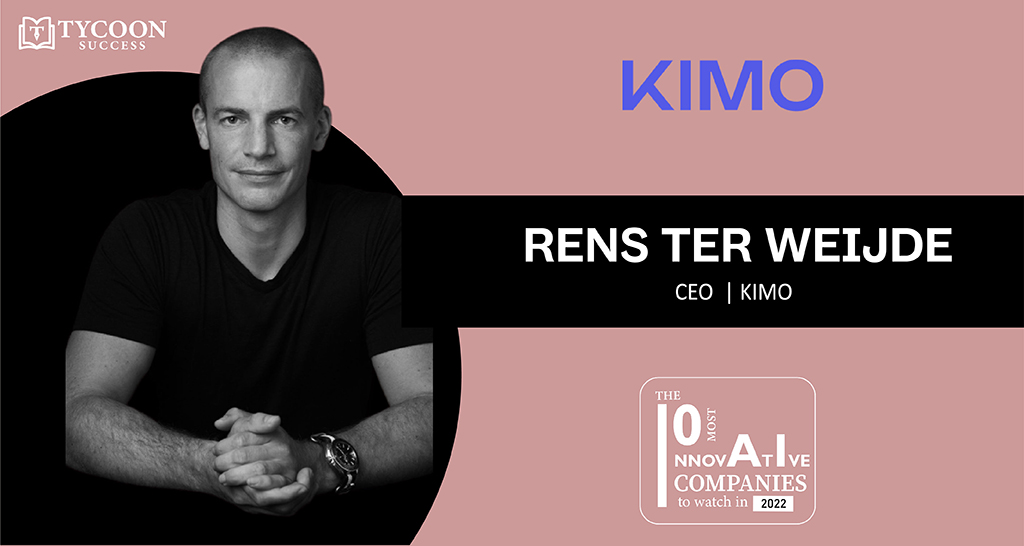With the intent of providing personalized education at a scale, Amsterdam-based Kimo, was established in 2018. With +1 billion in need of upskilling in digital domains in the coming decade, Kimo believes that’s a big deal. In practice, personalization means Kimo’s system can tailor learning content to the specific context and needs of the student. Behind the scenes, that means Kimo needs to have millions of content items in all formats (e.g. videos, courses, books, articles, podcasts, market reports, etc.), difficulty levels, and price points. The essence of the company is thus content curation.
Purpose Driven Leader
Kimo is being led by its CEO, Rens ter Weijde, who started his career as a sports psychologist, working with athletes to improve their performance. Rens worked in professional football, field hockey, free diving, base jumping, and with artists in Cirque du Soleil. After some successes Rens joined McKinsey & Company to do similar work with their clients. A few years later he left the organization to build his own impact + strategy consulting company called Purpose+. Rens led this company for 6 years, he and his colleagues worked for 80 clients, including G20 summits. After that Rens was looking for, something new and challenging and realized that EdTech needed a significant upgrade.
Rens believe, the AI industry is one of the most fast-moving industries in the world today, with some improvement areas (e.g. parameters in large language models) seeing a CAGR of +100%. It’s also an area where many great minds work together and share knowledge, e.g. through code and papers. For Rens, he sees it as an extension of psychology, which is his original domain of interest. One could see AI research as a decentralized way of testing many psychological hypotheses, done by many developers globally and with lots of budget behind it.
AI Industry Trends
Rens realizes many things are happening, depending on the angle you take – tech, philosophy, competition, regulation, etc.
He believes a few relevant trends are changing the AI industry; First of all, the data-centric AI approach advocated by Andrew Ng is an interesting change of perspective in Rens’ view, as much progress depends on the quality of the data now.
Second, the race for specialized silicon to run AI software more efficiently (cloud or edge) is intriguing to watch as well, coming from both big players like Nvidia and Google as some new kids on the block.
Third, the rapid rise of large language models in recent years (e.g. GPT3, Megatron-Turing, Wu Dao) based on the transformer infrastructure is something to keep an eye on, as similar things may happen in other domains.
Fourth, zooming out to a geopolitical level, there is clear competition for AI progress and talent between nations, with many countries drafting an AI strategy and significant budget allocations.
As a final trend, Rens mentions the regulatory landscape ,which is emerging, combined with the preference of some companies to reduce their dependency on big data.
AI has millions of use cases for society. Rens believe the general trend to be, one of ‘human + machine’ augmentation, not direct competition for jobs. For customer service specifically, there are many ways to
- Pre-segment calls based on text
- Provide smart support to CS agents through AI suggestions, sentiment monitoring, etc
Helping People to Learn New Things
KIMO is a meta-level platform, it doesn’t make its content and Rens believe they don’t have to. As an organization, Kimo realized a few things that were not common knowledge, in education companies.
First, there is enough learning content for most areas on the web, making more is not necessarily the solution to drive engagement.
Second, the web is heavily polluted and ad-heavy, thus curation and/or finding direction for people is hard.
Third, people spend 5 hours per week, 260 per year, on average on the web, ‘trying to learn new things, versus 10-20 hours per year, in the organization they work for.
Fourth, people mostly look for ‘short content’ instead of, long content (e.g. courses, which have a 95% dropout).
Fifth, most people patch together content in different formats depending on the context, e.g. a podcast for a bus ride, or a book chapter for the weekend.
Effect of the Pandemic
Even during the pandemic, Kimo’s funding perspectives were still positive due to low a low-interest-rate environment, excess capital, etc. AI did some amazing work during the pandemic to speed up progress in certain areas, although largely out of sight. Rens also believe it will inspire new AI in healthcare trends, in the coming years, see e.g. AlphaFold from DeepMind.
Mission and Vision
Kimo’s mission is to provide personalized learning at scale, with a strong focus on emerging economies where access to high-quality education is harder. The firm believes that having a system that curates all the learning content on the web (note: 95% is free) is the way to go, given that the web contains everything but is also heavily polluted.
Future Roadmap
When it comes to the future, Kimo is headed to full-scale personalized learning, on N = 1 level, reaching 5 million users minimum in the next 2 years. On being future-ready, the firm is deeply embedded in expert networks in the tech industry, and it invites two guest speakers a week for its students on a wide range of topics.

